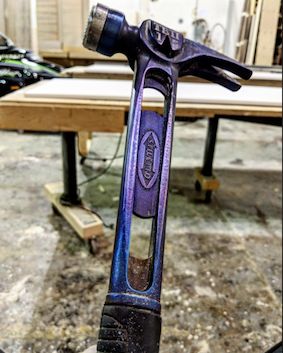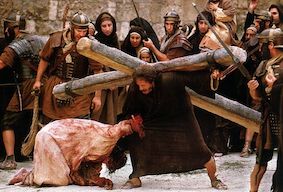Why Should God Have To Suffer?
We are quick to ask why people suffer when the far more significant question, especially during the Lenten season, is why should God have to suffer?
What we fail to realize is that suffering exists, first and foremost, not for us, but for Christ. Although man’s rebellion was the original cause of suffering in the world, Jesus’ obedience is the final cure. Without the sacrifice of Christ, suffering would lack its redemptive promise.
Thus, it can be said that all suffering was aimed, from the beginning, at him. To that end, it was established before the beginning of the world that Jesus should take the suffering of the whole world upon himself. In this sense, it can be said that all suffering was meant for Christ. It may visit us but only on its way to him.

At the cross, Jesus received our pain and suffering. On the cross, he took the punishment of sins past, present, and future upon himself. The buck stopped at the cross.
This is important to acknowledge because it corrects something that we, from our self-centered perspective, fail to grasp. Christ doesn’t share in our suffering, we share in his. God doesn’t enter into our pain, we enter into his.
In eternity, when we reflect on our earthly experience, we will view our suffering with a truer and more accurate perspective. No signs of our sin and of our suffering will be seen on our bodies, but they will be visible on his. The scars on his wrists, and the wound in his side, will forever remind us that suffering hit its mark.
"I want to know Christ--yes, to know the power of his resurrection and to share in his sufferings..." (Philippians 3:10).
The $300 Hammer
I once spent two weeks in Brownsville, Texas, volunteering for World Mission Builders erecting a church from the ground up. When we left it was ready for brick on the outside and drywall inside.
While we saved the newly planted church nearly a half a million dollars in labor, it still was very costly work. Not only did it cost time, it also cost a lot of pain. Hammering nails all day takes its toll on the forearms, especially untrained forearms like mine. I had never hammered so many nails. I hammered floor joist braces, hammered spacers up in the rafters, hammered off the same spacers once the rafters where supported.
We were hammering all the time, and my arms ached all the time. I even bought some BenGay at a local Walmart and rubbed it in each night.
On the very last working day of the trip, a vendor showed up carrying five hammers for us to try out. I just happened to be standing close enough to receive one. It was made of titanium and looked very modern. The rep said the hammer retails for $300. I felt very unqualified to be the new owner of a $300 hammer and yet I couldn’t wait to bring it back home and show it off to my family and friends. I asked the rep what made it so special, and he explained that the design of the hammer absorbed the shock that causes muscle fatigue. I knew that fatigue well.
I had some final jobs to do that afternoon, and as usual they included some hammering. So I tried out my new $300 hammer, and immediately felt the difference. My first thought was, “This is exactly what I need!” My second thought was, “Where was this two weeks ago!? This is the last day of my mission trip, I have already been through a bottle of Advil and half a tube of BenGay!”

After reflecting on my work trip, I have come to appreciate exactly how the events in Brownsville turned out. If the vendor would have shown up on the first day and handed me the $300 hammer, I never would have known its true worth. I certainly wouldn’t have gone home night after night nursing my forearms. Most importantly, I would have never felt the difference between a $30 hammer and a $300 hammer.
Sometimes we need a little pain to appreciate the remedy.
Additional Application:
The pain we have experienced, whether because of our own choices or simply because of life's difficult circumstances, makes the cross all the more meaningful.
Imagine if Jesus had taken away not only our sin debt at the cross, but also all suffering and pain. We would exist in this world without any first hand knowledge of suffering. Pain would be an historical subject, but not something experiential. Would we ever really know what Jesus went through for us?
I know none of us can fully grasp the depth of humiliation, agony and suffering Jesus experienced as He hung on that cross, but we can imagine at least some of it. We've all experienced some degree of pain, loss, and suffering in our lives. If we hadn't, Jesus suffering would be completely unrelatable.
Take it a step further and consider the cure. If we never even touched the edges of the sufferings of Christ, would we be able to appreciate the freedom the cross brings? Would we feel the weight lifted, the guilt paid for, or the shame taken away? Would we long for the promises of the cross, including the day Jesus wipes away every tear?
"Dear friends, do not be surprised at the fiery ordeal that has come on you to test you, as though something strange were happening to you. But rejoice inasmuch as you participate in the sufferings of Christ, so that you may be overjoyed when his glory is revealed" (1 Peter 4:12-13).
Illustration Exchange
What Would It Feel Like To Carry His Cross
"Imagine," says Anne Graham Lotz, "what it would have been like to be Simon, and to have carried the cross of Christ while following Him up Calvary:
"What would it have been like to have shared in the humiliation of rejection as He was cast out of the city? What would it have been like to have felt the sticky warmth of His blood from the cross on your skin? What would it have been like to have felt the encroaching horror as the place of execution neared? What would it have been like to have seen the executioners who stood waiting impassively with hammers in hand?"
[Anne Graham Lotz (1948 - ) is an American Christian evangelist. She is the second daughter of evangelist Billy Graham and his wife Ruth Graham. She founded AnGeL Ministries, and is the author of 11 books, of which her best known is Just Give Me Jesus.]

"What would it have been like," Lotz asks, "to have the burden of the cross lifted from your back as someone said, 'This is His cross; you're free to go now,' and He was nailed to it, not you?"
It is a relief shared by each one of us, each and every time we ponder His cross and His sacrifice on our behalf.
Indeed, "Burdens are lifted at Calvary."
"He personally carried our sins in his body on the cross so that we can be dead to sin and live for what is right. By his wounds you are healed" (1 Peter 2:24).